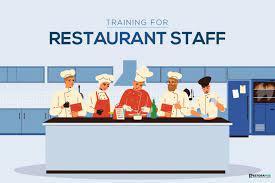When people think about starting a franchise business, the first things that come to mind are investment, location, and marketing. While those are important, one factor often gets underestimated: training and support. In the food industry, where speed, quality, and customer experience decide success, training can make or break your venture.
Support from the franchisor and consistent training for staff ensures that operations run smoothly, customers get consistent quality, and the business grows in a sustainable way. Let’s explore why training and support are not “optional extras” but the very backbone of a successful food business.
Why Training Matters in Food Businesses
Running a food business isn’t just about recipes. It’s about processes, systems, hygiene, customer service, and people management. Here’s why training is critical:
- Consistency Across Locations – A customer walking into your outlet in Delhi should get the same experience as someone walking into your outlet in Surat. Training ensures uniformity in taste, service, and hygiene.
- Higher Efficiency – Trained staff work faster, reduce errors, and save money by avoiding waste.
- Improved Customer Service – Training in soft skills like communication and handling complaints can turn one-time visitors into loyal customers.
- Adaptability – The food industry evolves constantly with new trends, technologies, and customer expectations. Training helps your team adapt quickly.
Support: The Silent Growth Driver
Support goes hand-in-hand with training. Even with the best manual or onboarding program, things can go wrong if franchisees don’t have ongoing guidance. Support from the franchisor ensures that the food business doesn’t just launch well but also sustains its growth.
This includes:
- Operational Support – Guidance on day-to-day challenges like inventory, staffing, or compliance.
- Marketing Support – Campaigns, promotions, and brand positioning.
- Technical Support – POS systems, apps, delivery platforms, and digital tools.
- Crisis Management – When things go wrong (say, a bad review or sudden staff shortage), franchisor support can be a lifesaver.
How Training and Support Boost Customer Experience
At the end of the day, customers don’t see the backend—they only experience the result. Training and support make sure what they experience is smooth, reliable, and enjoyable.
- A well-trained chef ensures taste never changes.
- A supported franchisee knows how to handle peak hours without chaos.
- Trained staff handle complaints politely and effectively.
All this builds trust. And in the food industry, trust is the key to repeat business.
Areas Where Training Is Essential
- Food Preparation – Recipes, portions, and presentation should remain consistent.
- Hygiene and Safety – Following food safety standards isn’t optional; it’s critical.
- Customer Interaction – Greeting, handling orders, and resolving issues.
- Technology Use – Operating digital POS, delivery apps, or kiosks.
- Crisis Handling – Training for emergencies, equipment failures, or service errors.
Support Systems That Truly Help Franchisees
Here are some practical support systems that franchisors provide to strengthen their outlets:
- Pre-opening Assistance: From site selection to layout design.
- Supply Chain Support: Ensuring raw material quality and cost efficiency.
- Regular Audits: Maintaining brand standards across outlets.
- Innovation Sharing: Passing down new menu ideas or operational hacks.
Why Training Saves Money
Some franchisees hesitate to invest time and money in training. But here’s the reality:
- Proper training reduces food wastage.
- Trained staff make fewer errors.
- Better service = happier customers = repeat business.
So, what feels like a cost is actually a long-term investment.
Case Example: Lessons from the Big Players
Look at global chains. Their secret sauce isn’t just the menu but the systems behind it. Employees get standardized training, and franchisees receive strong franchisor support. That’s why these brands scale smoothly without compromising quality.
Smaller food businesses can adopt the same principle. With strong training modules and reliable support, they too can stand out in crowded markets.
The Role of Technology in Training and Support
Tech is now a big part of food business operations. Franchisors often provide:
- E-learning modules for staff training.
- Apps to streamline inventory and sales.
- Analytics tools for better decision-making.
Support is no longer limited to phone calls—it’s integrated through digital platforms.
Why Training and Support Are Even More Crucial in Franchises
For independent restaurants, mistakes can be forgiven as part of experimentation. But in franchises, customers expect uniformity. They want the same taste, same service, and same standards everywhere. That’s why franchisors put a huge emphasis on continuous training and support.
This becomes even more vital in a food franchise, where speed and consistency are everything. One delay or a single bad experience can turn away a customer permanently. Proper systems in place prevent such risks.
Building a Culture of Support and Learning
The best food businesses don’t see training as a one-time activity. They build a culture where:
- Employees feel encouraged to learn.
- Franchisees feel supported, not left on their own.
- Continuous improvement becomes part of the DNA.
Long-Term Growth through Training and Support
Food businesses that invest in training and ongoing support grow faster, scale smoother, and build stronger reputations. It’s the difference between surviving and thriving in this competitive industry.
Final Thoughts
In the food business, recipes bring customers in, but training and support keep them coming back. A franchisee backed by strong franchisor systems and an employee team trained to handle every situation will always outperform competitors.
So, if you’re planning to step into the food industry, remember: your real competitive edge isn’t just your menu, it’s how well your people are trained and how strongly you’re supported.
That’s the true recipe for sustainable success.






